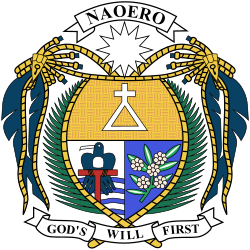This article needs to be updated. The reason given is: 2025 election.(October 2025) |
Parliament of Nauru | |
|---|---|
| 25th Parliament of Nauru | |
 | |
| Type | |
| Type | |
| Leadership | |
Deputy Speaker | Isabella Dageago, Non-partisan since 14 October 2025 |
| Structure | |
| Seats | 19 |
 | |
Political groups |
|
Length of term | 3 years |
| Elections | |
| Dowdall system | |
Last election | 11 October 2025 |
Next election | 2028 |
| Meeting place | |
 | |
| Parliament Building, Yaren | |
 | |
| Website | |
| naurugov.nr/parliament-of-nauru | |
| Footnotes | |
| * all candidates for Parliament officially stand as independents. | |
 |
|---|
The Parliament of Nauru has 19 members, elected for a three-year term in multi-seat constituencies. The President of Nauru is elected by the members of the Parliament. [1] The number of seats was increased to 19 following elections in 2013. [2]
Contents
The members of the Parliament of Nauru are elected by a positional voting system. [1]